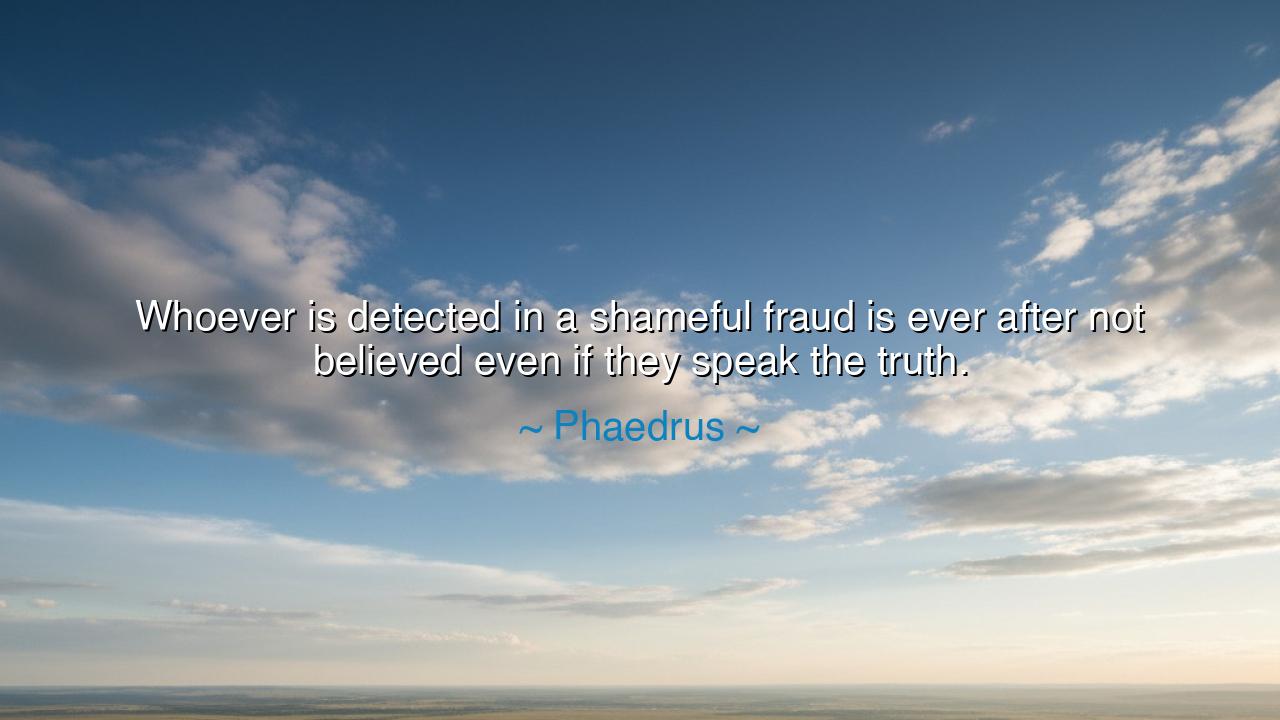
Whoever is detected in a shameful fraud is ever after not
Whoever is detected in a shameful fraud is ever after not believed even if they speak the truth.






Hear the grave warning of Phaedrus, the Roman fabulist whose tales carried the wisdom of the ages: “Whoever is detected in a shameful fraud is ever after not believed even if they speak the truth.” In these words lies a law as ancient as trust itself: that once the bond of honesty is broken, it is not easily restored. For trust is like fine glass—strong when whole, but once shattered, no craftsman can return it to its first perfection.
The origin of this teaching comes from Phaedrus’s fables, which drew from Aesop and the moral lessons of old. He saw how human society, fragile and interwoven, depends upon trust. Words are the bridges by which souls cross into each other’s hearts. But if a man once uses his words to deceive, he sets fire to that bridge. Thereafter, even if his tongue speaks truth, others will hesitate, remembering the ashes of betrayal. Thus the liar condemns himself, for his own past treachery poisons his present sincerity.
Consider the tale of “The Boy Who Cried Wolf,” preserved through the centuries. A shepherd boy, seeking amusement, deceived his village by shouting of a wolf when none was there. When the beast at last appeared, his cries were dismissed as another fraud, and the flock was lost. The story is simple, yet it endures because it embodies Phaedrus’s wisdom: a single pattern of deceit can ruin the power of truth, even when most desperately needed.
History itself bears witness. Think upon Richard Nixon and the Watergate scandal. When he was found guilty of fraud and cover-up, the trust of a nation was broken. Even when he spoke words of explanation or defense, they were received with suspicion, for his credibility had crumbled. His example shows that leadership without honesty is but a hollow throne, and that the stain of fraud casts a long shadow over all future words.
Yet this teaching is not only for rulers or great men, but for every soul. In families, friendships, and the smallest dealings of life, a single act of deceit can undo years of trust. The heart that has once been betrayed does not easily open again. To guard your truthfulness is therefore to guard your very honor, for once it is lost, no riches or power can restore its shine.
The lesson, O children of tomorrow, is clear: treasure your integrity more than gold. Let your words be few, but let them be trustworthy. If ever you stumble into deceit, know that the price is greater than you imagine—not only the shame of exposure, but the lifelong burden of disbelief. Better to suffer loss in silence than to gain by fraud, for the liar’s victory is short, but his disgrace is eternal.
Therefore, let your daily practice be this: speak only what you know to be truth, act with transparency, and let your promises be kept. Guard your reputation as a soldier guards his sword, for once broken, it cannot be wielded again. Remember that those who deceive others deceive themselves most of all, for they forfeit the very foundation of fellowship.
Thus heed the wisdom of Phaedrus: that a man found in fraud is doomed to distrust, even when he speaks truth. Walk the harder path of honesty, though it cost you much, and you shall live with dignity. For the world may forgive many faults, but it rarely forgets deceit.






BP31. Bich Phuong
Phaedrus’ quote makes me reflect on how hard it is to rebuild trust once it’s been broken. If a person is caught in a fraud, their future honesty will always be questioned. But is it really just to judge someone based on one mistake, or should people be given the opportunity to show they’ve changed? How do we balance the need for trust with the potential for personal growth and redemption?
MTMinh Thu
This idea from Phaedrus resonates with me in the context of modern society. Once a person’s integrity is questioned, it’s hard for them to be taken seriously again, even if they speak the truth. How does this affect our relationships and interactions? Are we too unforgiving when it comes to the consequences of a lie, or is it simply human nature to distrust those who have betrayed us in the past?
VHthit vit ham
I find this quote by Phaedrus both harsh and thought-provoking. It’s true that once someone is caught in a lie, their future words are often met with skepticism, no matter how honest they are. But is it possible for someone to truly regain trust after a fraud or lie? Or are we too quick to dismiss them completely, holding their past actions against them forever?
TQVo Trung Quan
Phaedrus’ quote raises an important point about trust and reputation. Once someone is caught in a lie or fraud, it seems like no matter how honest they are afterward, their credibility is forever tainted. Why is it that a single act of dishonesty can overshadow all future truths? Is it fair to judge someone based on their past mistakes, or should we allow people a chance to rebuild their trustworthiness over time?